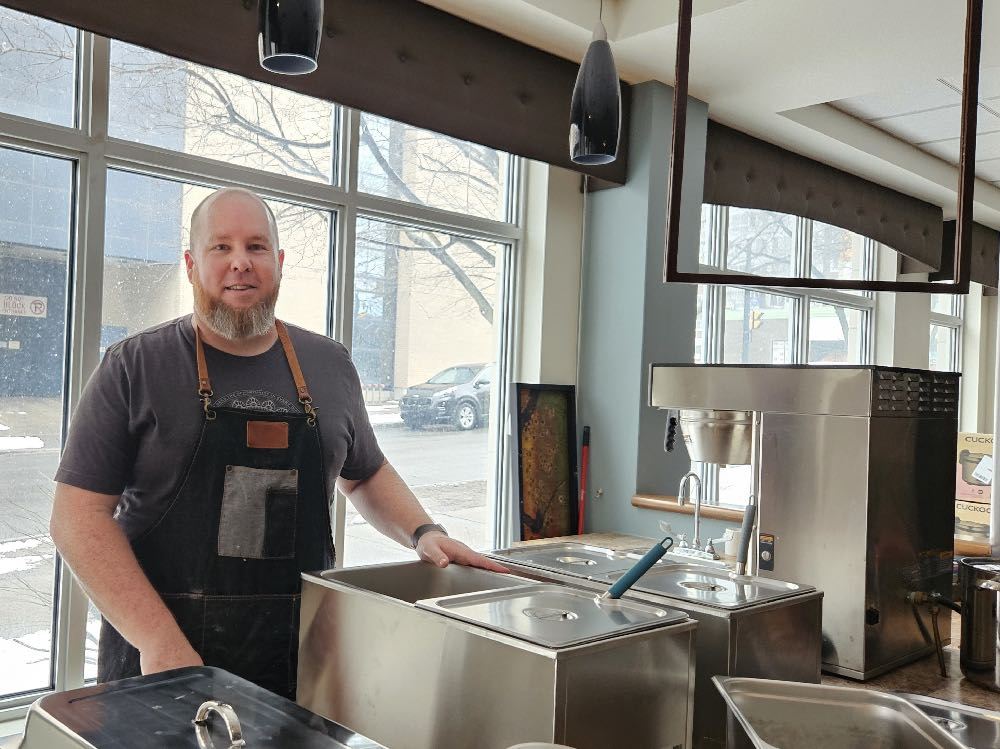This fall, St. Albans is continuing and expanding a pilot project it started last year at the University of Ottawa in response to food insecurity experienced by many university students. Last year, the parish began serving a meal once a month for students who do not have meal plans at their campus residence. This year, the plan is to serve a meal to the students twice a month, and St. Albans is looking for groups from other parishes, churches or faiths to partner in the project.
The Rev. Michael Garner began the project last winter after being dismayed by the number of students he met as a campus chaplain who could not afford adequate food and hearing that the campus food bank often ran out of food mid-week. He met with the head of residences for the university and learned that there are five buildings where students do not have meal plans and must provide their own food. Many of those students are in those residences because the meal plans are beyond their means. He suggested that St. Albans could host a meal for those students once a month and was pleased that the offer was welcomed.
With some funding from Open Table, an ecumenical project that St. Albans used to participate in with United and Presbyterian churches to host meals on campus before the pandemic, and a $5,000 grant from the Anglican Foundation of Canada, St. Alban’s hosted three meals at the Friel residence last winter.
Ironically, St. Albans is the only Anglican church in Ottawa that doesn’t have a kitchen, and the Friel residence doesn’t have one either, so parishioners did all the cooking in the homes (and one man brought a crock pot to his office to cook while he worked and then delivered it directly to the residence.) The meals were well-attended. About 150 students came to the first one, and the second time there were more than 200. There were some communication problems with the university for the third one, but there were still about 130 students for that meal. The first one for this coming school year is planned for Sept. 11.

While providing a meal once or twice a month won’t solve the problem of student hunger, it is a way of highlighting the problem, which is widespread through universities across the country. Garner has been involved with a working group focusing on the problem at the University of Ottawa campus. One of the things they are advocating on campus is a communal kitchen space for students for programming like cooking classes. Many students don’t have the skills to shop or to know how to cook healthy, inexpensive meals. “Given all of the challenges right now around the cost of food, those are even more important,” Garner said.
“The university asked us to continue the program, so we are going to do six meals this [school] year, every second week. St. Albans is going to do three, and I’m trying to get church partners, both Anglican and non-Anglican, to do the other three,” Garner says, adding that he is open to other faith groups who might want to participate as well. A Reform church is planning to do one meal.
This year, the Open Table fund provided $12,000, half of which is being used to pay a student co-ordinator, and the other half will pay for food and supplies. The alumni association heard about the project and donated $2,000 for equipment such as bain-maries to keep food hot while it is being served.
Garner says one of the goals this year is to build on the social aspect of the meals. Students in the residences without meal plans usually eat alone in their dorms. They have located bigger tables for this year and want to encourage the students to stay to talk with one another. The residence lead is also keen to make it a bit more of a social event to build up residence life. Garner added that he is encouraging St. Albans volunteers serving the meals to also talk with the students. “If there’s nothing to do in that moment, grab some food and sit down and have a conversation with a student. There’s so much information that loneliness is an epidemic in our society,” he said.
Garner is also looking for ways to help other parishes and churches participate. “I think a lot of churches feel a diminished capacity,” he said, encouraging them to get in touch with him if budgetary concerns are an obstacle. “I’ll get you the groceries if you can cook,” he said.


Saint Mary’s Church, Westmeath — Deanery of the Northwest